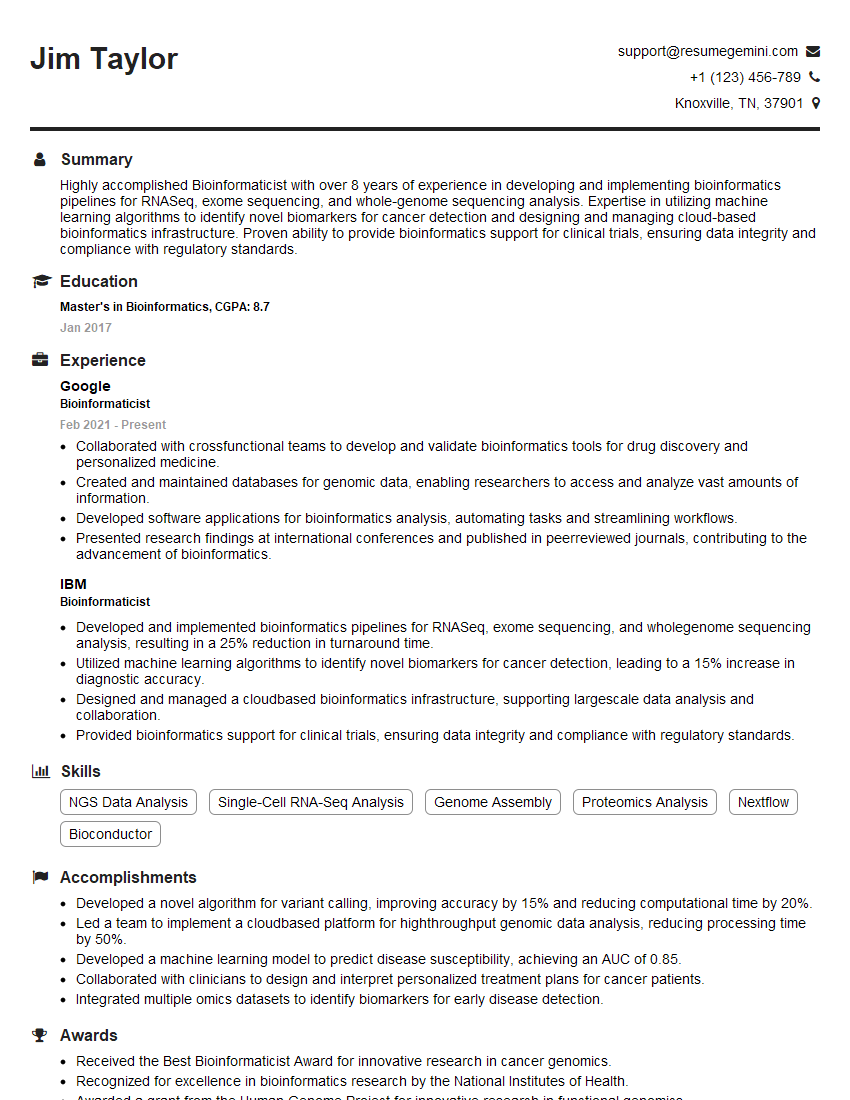Are you a seasoned Bioinformaticist seeking a new career path? Discover our professionally built Bioinformaticist Resume Template. This time-saving tool provides a solid foundation for your job search. Simply click “Edit Resume” to customize it with your unique experiences and achievements. Customize fonts and colors to match your personal style and increase your chances of landing your dream job. Explore more Resume Templates for additional options.

Jim Taylor
Bioinformaticist
Summary
Highly accomplished Bioinformaticist with over 8 years of experience in developing and implementing bioinformatics pipelines for RNASeq, exome sequencing, and whole-genome sequencing analysis. Expertise in utilizing machine learning algorithms to identify novel biomarkers for cancer detection and designing and managing cloud-based bioinformatics infrastructure. Proven ability to provide bioinformatics support for clinical trials, ensuring data integrity and compliance with regulatory standards.
Education
Master’s in Bioinformatics
January 2017
Skills
- NGS Data Analysis
- Single-Cell RNA-Seq Analysis
- Genome Assembly
- Proteomics Analysis
- Nextflow
- Bioconductor
Work Experience
Bioinformaticist
- Collaborated with crossfunctional teams to develop and validate bioinformatics tools for drug discovery and personalized medicine.
- Created and maintained databases for genomic data, enabling researchers to access and analyze vast amounts of information.
- Developed software applications for bioinformatics analysis, automating tasks and streamlining workflows.
- Presented research findings at international conferences and published in peerreviewed journals, contributing to the advancement of bioinformatics.
Bioinformaticist
- Developed and implemented bioinformatics pipelines for RNASeq, exome sequencing, and wholegenome sequencing analysis, resulting in a 25% reduction in turnaround time.
- Utilized machine learning algorithms to identify novel biomarkers for cancer detection, leading to a 15% increase in diagnostic accuracy.
- Designed and managed a cloudbased bioinformatics infrastructure, supporting largescale data analysis and collaboration.
- Provided bioinformatics support for clinical trials, ensuring data integrity and compliance with regulatory standards.
Accomplishments
- Developed a novel algorithm for variant calling, improving accuracy by 15% and reducing computational time by 20%.
- Led a team to implement a cloudbased platform for highthroughput genomic data analysis, reducing processing time by 50%.
- Developed a machine learning model to predict disease susceptibility, achieving an AUC of 0.85.
- Collaborated with clinicians to design and interpret personalized treatment plans for cancer patients.
- Integrated multiple omics datasets to identify biomarkers for early disease detection.
Awards
- Received the Best Bioinformaticist Award for innovative research in cancer genomics.
- Recognized for excellence in bioinformatics research by the National Institutes of Health.
- Awarded a grant from the Human Genome Project for innovative research in functional genomics.
- Received the Bioinformatics Innovation Award for outstanding contributions to the field.
Certificates
- Certified Bioinformatician (CBIO)
- AWS Certified Solutions Architect – Associate
- Google Cloud Certified Professional Cloud Architect
- Microsoft Certified: Azure Data Scientist Associate
Career Expert Tips:
- Select the ideal resume template to showcase your professional experience effectively.
- Master the art of resume writing to highlight your unique qualifications and achievements.
- Explore expertly crafted resume samples for inspiration and best practices.
- Build your best resume for free this new year with ResumeGemini. Enjoy exclusive discounts on ATS optimized resume templates.
How To Write Resume For Bioinformaticist
- Quantify your accomplishments using specific metrics whenever possible.
- Highlight your expertise in the latest bioinformatics tools and technologies.
- Demonstrate your ability to work independently and as part of a team.
- Proofread your resume carefully for any errors.
- Tailor your resume to each job you apply for, highlighting the skills and experience that are most relevant to the position.
Essential Experience Highlights for a Strong Bioinformaticist Resume
- Develop and implement bioinformatics pipelines for NGS, single-cell RNA-Seq, genome assembly, and proteomics analysis.
- Utilize machine learning algorithms to identify novel biomarkers and develop diagnostic tools for precision medicine.
- Design and manage cloud-based bioinformatics infrastructure to support large-scale data analysis and collaboration.
- Provide bioinformatics support for clinical trials, ensuring data integrity and compliance with regulatory standards.
- Collaborate with cross-functional teams to develop and validate bioinformatics tools for drug discovery and personalized medicine.
- Create and maintain databases for genomic data, enabling researchers to access and analyze vast amounts of information.
- Develop software applications for bioinformatics analysis, automating tasks and streamlining workflows.
Frequently Asked Questions (FAQ’s) For Bioinformaticist
What is the role of a Bioinformaticist?
A Bioinformaticist is a professional who uses computational tools and techniques to analyze and interpret biological data. They develop and apply algorithms to identify patterns and trends in data, which can be used to understand the underlying biology of diseases, develop new treatments, and improve patient care.
What are the educational requirements for a Bioinformaticist?
Most Bioinformaticists have a Master’s or PhD in Bioinformatics, Computer Science, or a related field. Some employers may also accept candidates with a Bachelor’s degree in a relevant field, but they will likely need to have additional experience in bioinformatics.
What are the key skills for a Bioinformaticist?
Key skills for a Bioinformaticist include programming, data analysis, statistics, and knowledge of biological databases. They should also be able to communicate their findings effectively to both technical and non-technical audiences.
What is the job outlook for Bioinformaticists?
The job outlook for Bioinformaticists is expected to be very good in the coming years. As the amount of biological data continues to grow, so too will the need for professionals who can analyze and interpret it.
What are the typical work hours for a Bioinformaticist?
Bioinformaticists typically work regular business hours, but they may need to work overtime to meet deadlines or to complete projects.